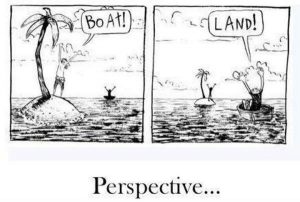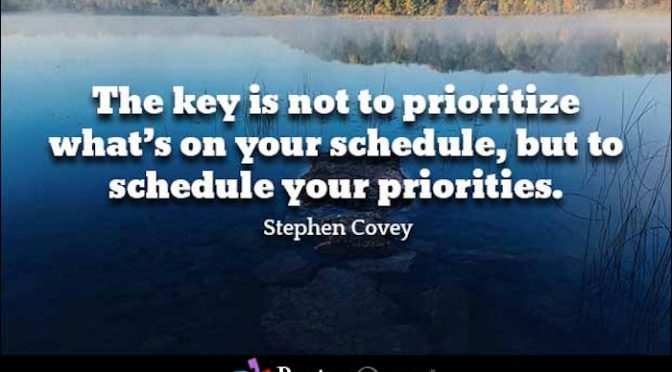Coming out of the tail-end of what we’ll call a “pollen bender”, I’m wide wake in time to see the sun rise and sit in relative silence with my thoughts. And, thanks to the wonders of medication, those thoughts are pleasant for now. Sure, I can hear a lawnmower running at 6:30 in the morning and I know I’ll be cursing that sun before it reaches the other horizon, but at least for right now I’m in an okay place. I might have breakfast today, I may make coffee, I’ll get together a schedule and try my best to make that schedule happen.
Or I’ll pass out again once the meds fully kick in (which is totally what happened today).
But, assuming I have long enough to make it happen, what exactly belongs on that schedule? Creative types who haven’t “made it” are faced with that question often. Every day we’re silently asked by the world at large whether today is a day you should go running head long at that wall. Our brain says that the skull is becoming fragile and that the wall hurts when we run into it, but our hearts say that one more good headbutt and we just might make it through. It’s brick but we’re persistent and we’ve heard other people who managed to headbutt through that wall just fine so it’s clearly a smart decision, right?

Getting to that “made it” point is known to be incredibly hard, downright brutal at times. We sacrifice our days to goals that the world tells us are unobtainable, then we’re told by that same world that if we don’t charge skull first into the metaphorical brick that we’re not really dedicated to it anyway. Damned if you do, damned if you don’t, and the schedule’s still not totally filled out. So you’re left feeling around blindly, trying to determine what’s really worth your time, and finding some regrets along the way. Because, until you see the results, everything is a…
Schrodinger’s Choice

The hardest part about filling out your schedules is, when tasks are optional, there are no right answers until you see the results. Though everyone will have an opinion on what you should be doing, their opinions are based entirely in hindsight and their expectations are based on other people. Would your time be better spent working on a particular project, dedicating to marketing, or trying to start up a new idea? No one knows, but they’ll pretend they do and they’ll make damn sure you know it. You’ll even do it to yourself, from time to time. But every time we make those decisions or lament them we’re doing it based on anecdotes and expectations – none of which mean as much as we think they do.
The subject came to mind for a few reasons over the last 24 hours. Conversations with people from many angles left me questioning my own decisions for a bit, then remembering why I made them at the time I did. Within hours of each other, one person demonstrated that my choices in life had left me in a worse place than I would have liked to be, then another person thanked me whole heartedly for making sacrifices on their behalf years ago. That choice to sacrifice for someone else directly led to where I am today, and until the second person spoke up out of nowhere I had a moment to pity myself. It’s strange how people from two different perspectives can see the same series of choices in completely different lights.

I’ve known people who’ve decided that a decision is smart or stupid based solely on the results someone else got. More than one person has told me in the past that dropping out of college is a great idea because people like Bill Gates (or hell, even Kevin Smith) have done it. To decide it’s a smart decision based entirely on that is just showing how little you’re thinking it through. I’ve also known people who’ll say if you want to be a writer you should quit your day job and dedicate your every waking moment to it. Usually these people have no skin in the game themselves, but they think it’s a great idea. You know, because it worked for JK Rowling to write her debut novel while living on welfare. So, under that kind of influence, we often punish ourselves for the decisions we make or the decisions we didn’t make simply because we didn’t get the results we wanted.
But nothing about the choices themselves are actually what went wrong. JK Rowling didn’t become a (temporary) billionaire because she’d decided to go onto welfare to dedicate herself to her work. She very nearly went the other direction as countless publishers shot her down for her book being “too long” for a children’s audience. And, frankly, if it had gone the other direction everyone around her would have called her a moron for her troubles (maybe more politely). But did she do the wrong thing for herself? Clearly not. It’s entirely about your priorities and what’s right for you – everyone else can stick their opinions and their suggestions in the box with the proverbial cat.

If you want to dedicate yourself to paying off your student loans and getting steady work rather than roughing it like Rowling did – you made the right choice for you. If you want to dedicate yourself to your work in hopes that greater effort will result in better outcomes – you made the right choice for you. So long as you do what’s best for you and you don’t hurt yourself or someone else – you made the right choice even if you don’t get the right results. There are no assurances or absolutes, so you can’t make your decisions based on what happened to other people or what you feel like you “should” be doing. Whatever works for you is what you should be doing and hopefully, if you’re lucky, it’ll pay off.
I won’t go on to say that you shouldn’t make the tougher choices when they’re in front of you, far from it. I also wouldn’t recommend you take the riskier option every time like some sort of gambling addict. You know your priorities and you should act on those priorities so long as they’re in order. But I’ve known too many people who beat themselves up for not putting in the same sort of dedication as others or who regret not choosing a steadier path when it doesn’t all pan out. They talk about how the choices themselves were wrong, that they’d made a mistake, but overlook just how much of the results were out of their hands to begin with or that they got better results on the things that were actually a priority to them. Sometimes, we detour from one goal to achieve another, and we can’t go beating ourselves up for that sort of thing.
I know the topic is a bit out of left field, and there are a lot of people who won’t fully understand. But, to those who read it and needed to be told this, try to hold onto it. What you do with your time, what you do that’s right for you, is what you should be doing. We can’t control where that ends up or whether or not we become one of the success stories or one of the failures, we can just do our best to do what we can with what we have when we have it. It’s all we can do, it’s all we should be expected to do. So long as you take care of yourself and your responsibilities, so long as no one’s hurt by the decisions you made, you made the right choices. After all, as much as we like to hope that we control our outcomes…
We really never know until we open that box.
(I write novels and cryptic blog posts. I also tweet. In fact, I may be tweeting now, but you’ll never know until you collapse the wave function.)







